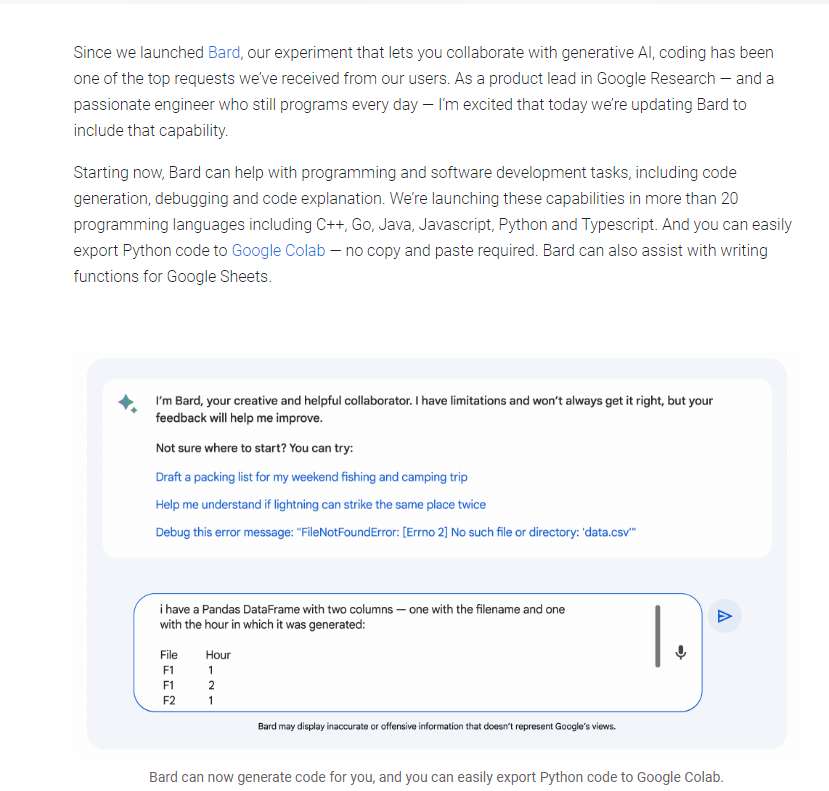On Friday, April 21, Google officially announced that its generative artificial intelligence chatbot Bard can be used to participate in software development, with new features including helping to write code, removing code bugs, interpreting code snippets, and writing functions for the online spreadsheet Google Sheets, and translating code from one language to another.
According to the head of product at Google Research, Bard has been one of the hottest requests since it was opened to the public in March. New programming features are available in more than 20 programming languages, including C++, Go, Java, Javascript, Python, and Typescript. Python code can also be exported directly to the Google Colab cloud working platform.
According to Google, the code-generating feature is especially useful for people learning programming for the first time, or who need extra support to understand what a piece of code might output. Not only can Bard debug error codes or code that isn't working as expected, but it can also help accelerate software development, solve complex problems, and inspire innovation based on the prompt, "Help optimize existing code faster or more efficiently."
Google specifically notes:
"Bard is still in the early stages of experimentation and may sometimes confidently present inaccurate, misleading or false information. On the coding side, Bard may provide code that does not produce the expected output but works, or that is not optimal or incomplete.
Users are advised to always double-check Bard's responses, carefully testing and reviewing the code for errors, vulnerabilities, and weaknesses. If Bard gives the answer by citing it in detail from an existing open source project, it will give where the source code came from. ”

Some analysts said that given that competitors in the generative AI field such as ChatGPT and Bing AI have supported code generation functions, it is not difficult to predict that Google, which chooses to compete, will launch similar functions. However, Bard, which only launched in March, is not as popular as ChatGPT, which was launched last year. Other tools that use generative AI programming include GitHub's Copilot and OpenAI Codex.
It is worth noting that GitHub, the world's largest code hosting platform, was acquired by Microsoft in 2018, and OpenAI, the parent company behind ChatGPT, is also heavily invested and backed by Microsoft. Microsoft is currently the biggest winner in the AI competition.
Previously, it was reported that Samsung's new mobile phone will replace Google with Microsoft Bing as the default search engine, and Google "panicked" said that it would fully promote the new AI search engine. Google is also merging DeepMinsd with Google Brain this week, and the market believes that the merger of Google's two AI-focused teams will help the company gain an edge over the AI competition.
Law firm Womble Bond Dickinson said in a note that AI tools that can generate code have exciting potential, but that users who want to take advantage of these technologies should take precautions "so as not to hit rocks hidden under the surface of machine learning algorithms."
According to the article, Samsung recently experienced three corporate secret leaks involving ChatGPT. Twice semiconductor engineers entered confidential source code information into ChatGPT to fix and optimize the code. Another productivity-conscious employee asked ChatGPT to summarize the minutes. Since ChatGPT retains user input data for self-training, the employee inadvertently leaked Samsung confidential information to OpenAI:
But inadvertently revealing confidential information isn't the only potential pitfall to using ChatGPT, as evidenced by the recent class-action lawsuit filed against GitHub, its parent company Microsoft, and its business partner OpenAI.
The plaintiffs allege that Copilot, GitHub's AI coding assistant, misappropriated software that could be traced back to open-source repositories or open-source licensees. GitHub admitted to using data from a large amount of publicly accessible code repositories on GitHub to train Copilot, much of which allegedly required attribution to the original author. But Copilot copied a long piece of code without mentioning the original author.
AI users who are particularly interested in generating code should carefully examine the source code. If a company generates code using AI, it should run the generated code through an open-source licensing tool to determine where the code came from and check if the code is licensed.
While code written by AI itself may not be copyrighted (the Copyright Office recently reiterated that any work must have sufficient human creative participation to be copyrighted), source code written, conceived, or outlined by humans, even with the assistance of artificial intelligence, may be copyrighted.
When using AI tools, companies should also consider whether content imported into AI is considered a trade secret, whether sufficient steps have been taken to confirm and protect the confidentiality of the content, and whether any output of the AI is also a trade secret. ”
But Google has stepped up its war. On Sunday, Google CEO Sundar Pichai warned that AI could be very serious if it was not deployed properly. Despite the sense of urgency, Pichai warns companies not to be drawn into the competitive landscape. He believes that society is not ready for the rapid development of AI, so stronger regulation is needed.